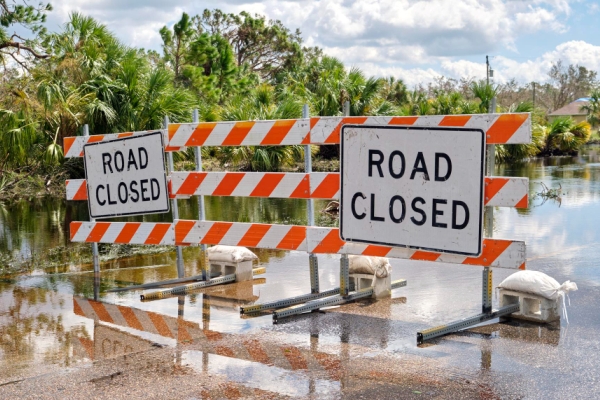In the aftermath of a hurricane, most individuals feel hopeless and are in a state of dismay. Many return to severely wrecked homes, while others come home to moderate damage. Surviving a hurricane and emerging physically unscathed is something to be grateful for, but many perils lie ahead. Even once the storm departs, it leaves behind several obstacles that you need to be able to recognize. Treacherous situations are abundant after a hurricane, in both your home and on the streets. Heed these warnings to protect you and your loved ones post-hurricane.
Steer Clear of Standing Water
When Hurricane Ian made landfall in Florida, it brought powerful winds and heavy rainfall. Multiple areas in the state saw several inches of rainfall, with some parts of Florida receiving greater than 10-inches. This record-breaking rain, alongside the 150 mph winds, induced floods that swept across the state. These enormous floods will leave unsafe standing water. Standing water is exceptionally dangerous because downed powerlines can cause an electrical current that may electrocute anyone walking or wading through the water. Thoroughly wash your body if you come in contact with standing water because it contains germs and bacteria that can make you ill.
Some might think it is safe to drive through flood water, but it is not. Vehicles can stall in standing water, and dangerous debris or hazardous sinkholes lie beneath flood water.
Prevent Carbon Monoxide Poisoning
The power may remain out for several days after a hurricane. Therefore, individuals rely on generators, charcoal grills, camp stoves, and power washers to carry out daily activities. Yet, this fuel-burning equipment produces carbon monoxide, an invisible poisonous gas you cannot smell. To avoid carbon monoxide poisoning, ensure your carbon-monoxide detector is operational. Also, do not use fuel-burning appliances inside of your home.
Drink Clean Water and Safe Food
Your city’s power source is responsible for filtering the water supply. So, if a hurricane knocks out electricity in your area, this can compromise the faucet water. Use bottled water to stay hydrated, cook, make infant formula, and for hygienic purposes. Look out for boil water notices from local officials and strictly adhere to their water recommendations.
Throw away any food, canned or otherwise, which has encountered floodwater. If you experienced an extended power outage, ensure to throw out perishable products in your refrigerator. It is better safe than sorry when it comes to potentially spoiled foods.
Do Not Enter Compromised Buildings
Even if a building is still standing, this does not mean that it is structurally sound. Unless local authorities confirm that a structure is safe, do not enter it. Also, exit a building immediately if you hear odd sounds while inside, like creaking or shifting. These sounds may indicate that the building is about to collapse. Furthermore, we understand if you are eager to return home to assess the damage, but if your area is still under evacuation, you must wait. Refer to your local news outlets on whether you can safely return to your area.

